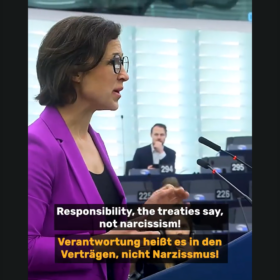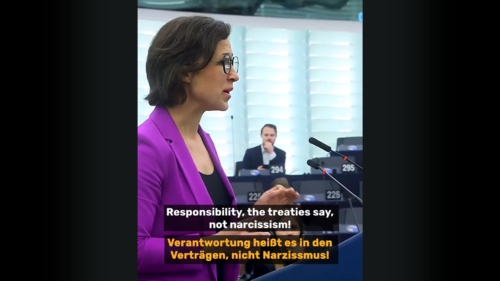As Chair of the European Parliament’s Delegation to the Arab Peninsula (DARP), my work sometimes is a diplomatic tightrope walk. This was the case during the latest DARP mission to the United Arab Emirates from 22-26 May. The mission, which I headed, took place against the backdrop of tensions between the EU and the UAE. In September last year, the European Parliament had issued an urgency resolution on the human rights situation in the UAE, calling on companies and EU Member States not to participate in the EXPO Dubai “ in order to signal their disapproval of the human rights situation“ (I had travelled to the EXPOfor a speech on the Green Deal that had been arranged prior to the resolution). The Emirati authorities had protested this resolution. Following the Russian invasion of Ukraine, the UAE had furthermore abstained from an UN Security Council resolution condemning the aggression. Finally, on 13 May, nine days before the mission, the late UAE President Sheikh Khalifa bin Zayed al-Nahyan had died and no high-level EU representative had travelled to UAE to attend his funeral – a fact UAE officials had criticised.
EU-UAE relations, therefore, had been visibly strained, and re-establishing a constructive dialogue with UAE authorities was a major goal of this mission. Our aim was to address a number of topics, especially climate change and renewables, humanitarian aid and regional security, as well as women’s empowerment – while remaining outspoken on human rights issues and disagreements regarding armed conflicts in the region, including Yemen.
Following the release of the EU communication on a “Strategic Partnership with the Gulf” days before our departure, this mission was also a first opportunity to discuss visions, opportunities and challenges outlined in this document with UAE government representatives.
Foreign Relations – armed conflicts
At meetings with members of the Federal National Council (FNC), including FNC Speaker Saqr Gorbash and Ali Rashi Al Nuami, Chair of the UAE’s Foreign Affairs Committee, we highlighted the need to further stabilize the Gulf region. All participants agreed that we should reinforce relations between the Gulf Cooperation Council (GCC) and the EU. But there were also areas where our views differed – we were however able to openly discuss these disagreements. Our Emirati counterparts expressed their distrust when it comes to the intentions of the Iranian government and their doubts regarding the EU’s efforts to revive a nuclear deal with Iran. Further, the Emiratis criticised Iran’s destabilising actions not only in Yemen (with its support of the Houthis) but also in Lebanon and Syria – we acknowledged this controversial role of Iran in the region.
The Emirati Members of Parliament recognized the attack on Ukraine as an intentional violation of the independence and territorial integrity of a sovereign UN member state. They however did not follow their European colleagues in unconditionally condemning Russia’s actions, preferring to soften their tones vis-à-vis Moscow. But they also made it clear that the UAE are ready to expand their oil production with a view to increasing supplies to Europe. The UAE would moreover like to play a diplomatic role in the settlement of the crisis.

There was mutual agreement that food security constitutes a crucial condition to ensure peace and security and that we should strengthen our cooperation on this issue. We also concurred that it is of utmost importance to continue funding for humanitarian aid, including in Ukraine.
Finally, we visited the International Humanitarian City, a global hub for humanitarian emergency preparedness and response, and met with its Directorate-General, Giuseppe Saba. During this meeting, we focussed on the Emirates’ strong role in the field of humanitarian relief and disaster prevention.
Climate and renewables
We also discussed the topic of climate change with Emirati officials. The region has the potential to play a major role in slowing down climate change by switching from oil and gas exports to the export of renewables, such as green hydrogen. However, the question of storing and transporting energy (in order to be able to export it) is still open and we talked about different ways to address this challenge. Lowering emissions of harmful pollutants was another key issue mentioned at meetings with Emirati representatives. There was a general understanding that these issues need to be dealt with rapidly and efficiently at a global level instead of being left to the goodwill of national authorities.
Climate change and environmental problems were also mentioned during our meeting with representatives of the UAE Ministry for Environment and in the context of our visit of Masdar City. Masdar City, de facto a district of Abu Dhabi, is the first project in the UAE aimed at creating a new “zero emission” city, using renewable energies and modern recycling plants for waste.
The delegation also met with the Director-General of IRENA (the International Renewable Energy Agency), Francesco La Camera, in Abu Dhabi. This discussion offered an opportunity to recapitulate the various initiatives aimed at increasing the supply of renewable energies to EU member states, which all cooperate with the Agency.
One key takeaway of our meetings was that we need to work together to diversify our energy sources and make the switch to renewables. There is big potential for collaboration in setting technical standards and aligning financial instruments used to support the transition.


Human Rights
As expected, the UAE’s representatives were rather reticent with regard to the topic of human rights. They highlighted some labour law reforms; progress made in the area of social rights, and underlined the UAE’s strong commitment to fostering gender equality. However, they de facto denied that the protection of human rights is still a real issue for the Emirates.
From the European Parliament’s point of view, human rights violations nonetheless remain an important issue when it comes to the EU’s relations with the Emirates. The EP had voiced its concerns regarding a number of human rights issues (including the case of Human Rights Defender Ahmed Mansoor) in recent years, the last time in September 2021.
The “National Human Rights Institution” (NHRI) has recently been established in the UAE to provide an advisory role to government, nongovernment, civil society and academia representatives and to receive complaints and concerns from all individuals and entities. Its Chairperson Masqud Kruse gave a presentation on the work the NHRI has carried out so far, after which we discussed ways of improving the protection of human rights in the country.
It is clear that the UAE still has a long way to go to improve its human rights situation. The implementation of existing laws remains an issue, as well as restrictions of political freedoms and the imprisonment of human rights defenders and dissidents. The Kafala system (a work visa sponsorship system to issue work permits for foreign nationals, criticized by human rights organisations for enabling the exploitation of workers) remains in place, despite some progress regarding worker’s rights. We expressed our hope that Masqud Kruse will be able to fully implement the NHRI’s mandate – of course, we will make sure to follow up on the progress made.


Strengthening of women's role in society

The strengthening of the role of women in Emirati society was also addressed during meetings with the FNC. Women enjoy a privileged position in the Emirates where they represent more than 50% of the global workforce and have reached a high level of education. Women are present in all branches of the Public Administration and by law have the right to occupy 50% of total FNC seats.
We also discussed women’s empowerment with the founder of the NGO “She is Arab”, Samar Alshorafa, who presented her organisation’s work and gave an overview of the situation of women in the country. Indeed, women are in a much better position in the Emirates compared to neighbouring countries, as demonstrated i.a. by the gender quotas applied by the FNC and the number of women in high-level positions in both government administration and private companies.
Our visit to the Dubai Foundation for Women and Children was particularly impressive. The foundation offers support and shelter to women and children who have been victims of violence or other crimes. This includes not only Emirati nationals, but also resident women and children in need of help.
It became clear during our visit that there are many promising initiatives in the UAE regarding women’s empowerment. However, in a number of areas, women still legally do not have the same rights as men in the country. Despite this fact, many women have climbed the career ladder and hold leadership positions in the private and public sector – this is maybe biggest change the UAE has seen in recent years.
Against this backdrop, especially the younger generation now demands full equality for women.
Conclusions
As mentioned above, this visit was a tightrope walk – but we were able to strengthen our ties with our counterparts in the Emirates, and reinstate parliamentary relations with the FNC.
The mission has had many positive outcomes and highlighted possible fields of cooperation, such as trade, research, innovation, clean and renewable energies as well as security. But there are still many areas for improvement, especially when it comes to human rights. How can we assist those fighting for human rights in the country? For one, the European Parliament should keep up its support for the Dialogue on Human Rights between the European External Action Service and the UAE, for which another round was launched in the beginning of 2022. And we should not shy away from fair, honest and comprehensive discussions on the subject matter during diplomatic missions, such as this one.













